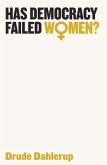It should not surprise anyone that democracies can become dangerously illiberal; indeed, it was one of the classical critiques of ancient democracies. Is the contemporary backlash against liberal democracy merely the same old story, or are we witnessing something unprecedented?
In this witty and engaging book, Aviezer Tucker argues that the contemporary revival of authoritarian populism combines the historically familiar with new technologies to produce a highly unstable and contagious new synthesis that threatens basic liberal norms, from freedom of the press to independent judiciaries. He examines how the economic crisis blocked social mobility and thereby awakened the dark, dormant political passions exploited by demagogues such as Orban and Trump. He argues that this slide towards 'neo-illiberal democracy' can be countered if we hard-headedly restore a 'liberalism without nostalgia' which institutes policies that can dampen down populist passions and strengthen liberal institutional barriers against them.
Readers interested in current affairs, social science, history, and political and social theory will find Aviezer Tucker's original theoretical and historical analysis incisive, innovative, and entertaining.
Hinweis: Dieser Artikel kann nur an eine deutsche Lieferadresse ausgeliefert werden.
In this witty and engaging book, Aviezer Tucker argues that the contemporary revival of authoritarian populism combines the historically familiar with new technologies to produce a highly unstable and contagious new synthesis that threatens basic liberal norms, from freedom of the press to independent judiciaries. He examines how the economic crisis blocked social mobility and thereby awakened the dark, dormant political passions exploited by demagogues such as Orban and Trump. He argues that this slide towards 'neo-illiberal democracy' can be countered if we hard-headedly restore a 'liberalism without nostalgia' which institutes policies that can dampen down populist passions and strengthen liberal institutional barriers against them.
Readers interested in current affairs, social science, history, and political and social theory will find Aviezer Tucker's original theoretical and historical analysis incisive, innovative, and entertaining.
Hinweis: Dieser Artikel kann nur an eine deutsche Lieferadresse ausgeliefert werden.
"For all his many sins, Herbert Spencer was correct to say, 'How often misused words generate misleading thoughts.' Aviezer Tucker has set out to drain a great swamp of such misuse, first showing how lazy conceptual conflations have befuddled thinking about the political distempers of our time, and then, having set the language straight, deriving unimpeachable good sense from the result. Democracy Against Liberalism is a tour de force of clarity and justified optimism bound to be of great value to scholar and student, theoretician and practitioner, alike."
Adam Garfinkle, founding editor of The American Interest and former speech writer for Colin Powell
"An easy read on a hard problem, Aviezer Tucker's study benefits from being a latecomer in analyzing the erosions of the liberal premises of some democracies across the world. Careful, insightful, and literate, Tucker's recommendation to attend to root causes without pining for a lost past is a godsend. Only a new vision of liberalism can save it."
Samuel Moyn, Yale University
"Aviezer Tucker's extensive knowledge of philosophical debates makes Democracy Against Liberalism a compelling read. His prose brings to life even the most analytically difficult elements of this topic, and expertly brings high philosophy down to matters of concrete policy relevance"
Richard Youngs, Senior Fellow, Carnegie Europe
Adam Garfinkle, founding editor of The American Interest and former speech writer for Colin Powell
"An easy read on a hard problem, Aviezer Tucker's study benefits from being a latecomer in analyzing the erosions of the liberal premises of some democracies across the world. Careful, insightful, and literate, Tucker's recommendation to attend to root causes without pining for a lost past is a godsend. Only a new vision of liberalism can save it."
Samuel Moyn, Yale University
"Aviezer Tucker's extensive knowledge of philosophical debates makes Democracy Against Liberalism a compelling read. His prose brings to life even the most analytically difficult elements of this topic, and expertly brings high philosophy down to matters of concrete policy relevance"
Richard Youngs, Senior Fellow, Carnegie Europe








